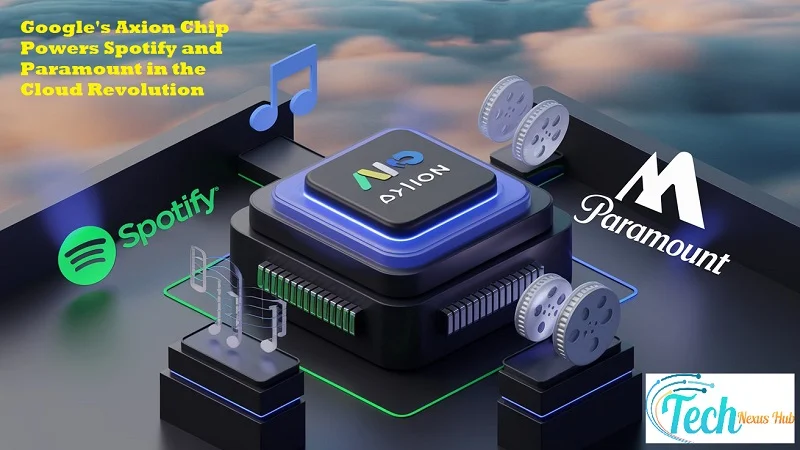Alphabet’s Google Cloud revealed that both, Spotify and Paramount Global have adopted a new Axion chip, Alphabet’s new CPU built with Arm Holdings’ technology for streaming services. This shift is to underscore Google’s efforts toward extending processing efficiency solutions for complex operations in the media and entertainment industries.
Google's Axion Chip Powering the Next Era of Streaming for Spotify and Paramount
It’s worth mentioning Alphabet has made the Axion chip available for all Google Cloud users, thus entering directly into the competition for versatile and potent cloud-based CPUs. That is why it is positioning itself as a supplier of specialized processors for developers who want to save resources, including money and energy.
Axion is not the single chip by Google Cloud in Arm architecture; similarly, both Amazon and Microsoft have proprietary Arm chips in the cloud. Ampere Computing, a firm founded by ex Intel chiefs that provides comparable chips to Oracle Cloud highlights a rising pattern towards basic equipment supplied by cloud providers.
The attraction of these Arm-based CPUs is mainly in the low power consumption. Arm processors work with much less energy while delivering the same capability as the conventional x86 CPU, which is why many tech giants with complex cloud services and StringSplitOptions concerns are turning to Arm.
While services such as Spotify and Paramount continue their search for quick and efficient ways to accommodate and work with millions of users Google’s Axion chip may become indispensable. The use of Arm technology by key players indicates transition occurs in the technology sector that favors cloud services that are not only strong but also eco-friendly.
Google's Axion Chip Powers Up AI with 60% Energy Boost in the Cloud
The new Axion chip has been designed to be used in Google Cloud services and the new chip is reportedly said to be 60% more energy efficient that the traditional CPUs. This efficiency translates to the fact that every watt which is saved can be used elsewhere, for example in powering sophisticated artificial intelligence and for that reason is a prized commodity for data intensive operations.
For its part, Google Cloud Compute and AI infrastructure Vice President and General Manager Mark Lohmeyer explained that this is the first Arm-based processor designed to be fully integrated into its overall Google platform. This is a step in its evolution of delivering high performance and low energy consumption for its cloud clients.
Google isn’t new to Arm-based instances, but this is the first one that Google designed and developed itself, let alone illustrating the opportunities it has in building efficient yet frugal computing platforms. This development is in line with Google’s strategy to keep its operational cost lower while providing the capability of scale up for demanding applications.
As AI and ML applications are expanding in the cloud, features like Axion – efficient processors – become decisive. Instead of directing energy savings toward these kinds of workloads, Google Cloud intends to provide developers with increased capacity and versatility without imposing energy costs.
;The new chip that has been developed by Google known as the Axion chip could be the new a game changer especially to company that are searching for high performing cloud computing resources that should not harm the environment. Future trends in data and AI will drive demand for solutions such as Axion appealing to industries interested in both speed and environmental impact.
Google Cloud Puts Power in Its Hands with New Axion Chip Rollout
Google Cloud shared that Axion, the company’s custom Arm-based chip, has been launched to all clients since it enabled some of the paid Google Cloud services. This expansion shows that Google is very much sure of their own chip in terms of performance and energy consumption.
Although Google Cloud still supports Arm cores from Ampere’s custom Arm-based chips plan, the Axion is starting with the intention. Google now wants to turn its own chip into the premier offering on its cloud computing platform, leaving even Intel-based options behind.
According to Mark Lohmeyer, head of Google Cloud’s compute and AI infrastructure, Google wants the Axion chip to be THE solution for clients of the future. This suggests a greater sense of autonomy and a willingness to better control the cloud hardware it needs.
The Axion chip, an exquisite design centred about efficiency, offers an excellent solution it expanding clients with extremely potent processing and energy efficiency. This action of Google turns the Axion as a priority shows that the company is very keen on power-saving innovation in clouds.
Therefore, while the demand for energy-efficient top-tier data services increases, Google’s Axion chip might be key in is convincing clients interested in high performance as well as sustainability. Google tries with this to underline its role as market leader in the competition field of cloud computing.


